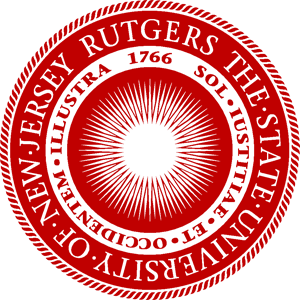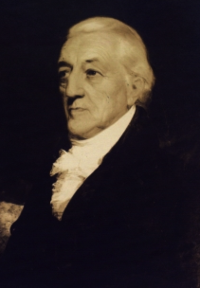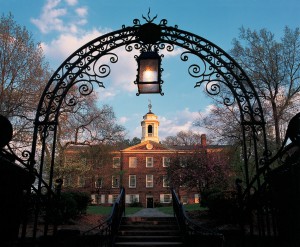
Chartered as Queen’s College on November 10th, 1766, Rutgers was the eighth institution of higher education founded in the colonies prior to the American Revolution. King George III of Great Britain granted the charter in response to a petition presented by the education-minded Dutch settlers of New Jersey and New York, and named the college in honor of Queen Charlotte of Mecklenburg, his consort.
While no copy of the original document has survived, a second charter granted in 1770 provides for the “education of youth in the learned languages, liberal and useful arts and sciences.” The first students were enrolled in 1771 to work under a single tutor, and the first student to graduate received his degree in 1774.

In the years immediately following its founding, Queen’s College continued to carry out the charter’s provisions, except for brief periods during the Revolutionary War when the two tutors then in residence departed for civil and military service.
These were hectic years for the institution as the British troops made periodic forays into the New Brunswick area, forcing faculty and students to find temporary quarters at various points in Somerset County. Continental troops were active in the vicinity as well. On the knoll now occupied by Old Queen’s, the university’s central administration building, Colonel Alexander Hamilton commanded a battery of artillery that harassed the British during Washington`s retreat from New York in 1776.

In 1825, the name of the college was changed to Rutgers in honor of Colonel Henry Rutgers, a veteran of the American Revolution, and early benefactor, “as a mark of respect for his character and in gratitude for his numerous services” to the institution. Col. Rutgers was the scion of a prominent Dutch-American family in New York City.
Rutgers College became the land-grant college of New Jersey in 1864, resulting in the establishment of the Rutgers Scientific School with departments of agriculture, engineering, and chemistry. Further expansion in the sciences came with the founding of the New Jersey Agricultural Experiment Station in 1880, the College of Engineering in 1914 (now, the School of Engineering), and the College of Agriculture (now, Cook College) in 1921. The precursors to several other Rutgers divisions also date from this period: the College of Pharmacy in 1892 (now, the Ernest Mario School of Pharmacy), the New Jersey College for Women (now, Douglass College) in 1918, and the School of Education (now, a graduate school) in 1924.
Rutgers College became a university in 1924. The legislature passed laws in 1945 and 1956 designating all divisions of Rutgers as the state university of New Jersey. During these years, the university expanded dramatically. An evening division, University College, opened in 1934. The University of Newark joined the system in 1946, and the College of South Jersey at Camden was added in 1950.
Since the 1950s, Rutgers has continued to expand, especially in graduate education. The Graduate School- New Brunswick, the Graduate School-Newark, and the Graduate School-Camden serve their respective campuses. In addition, the university has established professional schools in applied and professional psychology; communication, information, and library studies; criminal justice; the fine arts; management; and social work. Several of these schools offer undergraduate programs as well. In 1969, the university founded Livingston College to provide undergraduate degrees to a diverse community of students.
Rutgers is the only institution in the country to include in its heritage the colonial college of the eighteenth century, the land-grant tradition of the nineteenth century, and the development of the modern state university.

Rutgers, The State University of New Jersey, with more than 50,000 students on campuses in Camden, Newark, and New Brunswick/Piscataway, is one of the nation’s major state university systems. The university comprises 29 degree-granting divisions: 12 undergraduate colleges and schools, 11 graduate schools, and six schools offering both undergraduate and graduate degrees. Five are located in Camden, eight in Newark, and 16 in New Brunswick/ Piscataway.
Today, Rutgers continues to grow, both in its facilities and in the variety and depth of its educational and research programs. The university’s goals for the future include the continued provision of the highest quality undergraduate and graduate education along with increased support for outstanding research to meet the needs of society and to fulfill Rutgers` role as the state university of New Jersey.
The Queens Guard builds its ranks with students drawn from the University undergraduate schools, to represent Rutgers, New Jersey and the United States proudly throughout the world.
